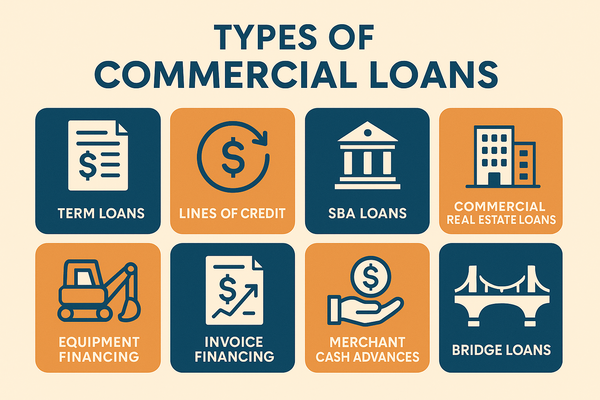
Securing the right financing is a critical step in growing and sustaining any business. Whether you’re launching a startup, expanding operations, or managing day-to-day cash flow, commercial loans offer flexible funding options tailored to different business needs. Understanding the types of commercial loans available can help you make informed financial decisions and align your borrowing with your strategic goals.
1. Term Loans
Term loans are the most traditional type of commercial loan. Businesses receive a lump sum of money upfront, which is repaid over a set period with fixed or variable interest rates. These loans are ideal for long-term investments such as equipment purchases, business expansion, or major renovations.
Best for: Capital expenditures, growth initiatives
Repayment term: Short to long-term (1–25 years)
Collateral: Often required
2. Lines of Credit
A business line of credit offers flexible access to funds up to a predetermined limit. Unlike a term loan, interest is only charged on the amount used, making it a practical solution for managing cash flow, covering payroll, or handling unexpected expenses.
- Best for: Working capital, cash flow management
- Repayment term: Revolving, renewable annually
- Collateral: May be secured or unsecured
3. SBA Loans
Backed by the U.S. Small Business Administration (SBA), SBA loans provide favorable terms, lower down payments, and longer repayment periods. They are especially beneficial for small businesses that may not qualify for traditional loans.
- Best for: Startups, small businesses with limited credit
- Popular programs: SBA 7(a), SBA 504, Microloans
- Collateral: Often required, but terms are flexible
4. Commercial Real Estate Loans
Commercial real estate (CRE) loans are used to finance the purchase, development, or refinancing of commercial properties such as offices, warehouses, or retail spaces.
- Best for: Buying or upgrading commercial property
- Repayment term: 5–20 years, often with balloon payments
- Collateral: The property itself
5. Equipment Financing
Equipment loans are designed specifically for purchasing business equipment, including machinery, vehicles, or IT systems. The equipment often serves as collateral for the loan.
- Best for: Businesses in manufacturing, logistics, construction
- Repayment term: Matches the equipment’s useful life
- Collateral: The equipment purchased
6. Invoice Financing
Also known as accounts receivable financing, this loan type allows businesses to borrow against outstanding invoices. It’s a useful way to unlock cash tied up in unpaid invoices.
- Best for: Businesses with long billing cycles
- Repayment term: Short-term (until invoices are paid)
- Collateral: Invoices
7. Merchant Cash Advances
A merchant cash advance (MCA) provides quick capital in exchange for a percentage of future sales. Though convenient, MCAs often carry high fees and are best used as a last resort.
- Best for: Retail businesses with high credit card sales
- Repayment: Daily or weekly via sales percentage
- Collateral: Future sales
8. Bridge Loans
Bridge loans offer short-term funding to cover gaps between financing needs, often used in real estate or business transitions.
- Best for: Temporary cash flow gaps, real estate purchases
- Repayment term: Typically under 12 months
- Collateral: Usually required
Choosing the Right Commercial Loan
When selecting a commercial loan, consider:
- Your business goals and cash flow
- The urgency of funding
- Interest rates and fees
- Collateral requirements
- Repayment flexibility
Consulting with a financial advisor or lender can help match your needs with the best loan product.